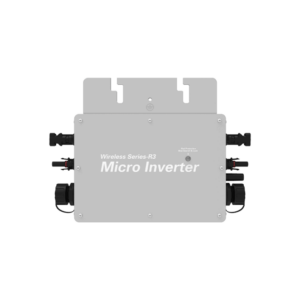目录
ToggleAs solar energy continues to gain traction in both residential and commercial markets, the technologies used to harness the sun’s power are evolving. Among the most innovative advancements in solar technology are micro inverters.
These small but powerful devices are transforming how solar energy is captured and converted, offering a range of benefits that make them a crucial component in today’s solar installations.
In this article, we’ll dive into what micro inverters are, their advantages, and why they are becoming more popular in solar energy systems.
What Are Micro Inverters?
At its core, a micro inverter is a device that is installed beneath each solar panel. Its main job is to convert the direct current (DC) generated by solar panels into alternating current (AC), which is the type of electricity used in homes and businesses.
Unlike traditional string inverters, which handle power conversion for an entire array of panels, micro inverters work on a per-panel basis.
This decentralized approach to energy conversion brings significant advantages, especially in terms of efficiency and system reliability.

Advantages of Micro Inverters
-
Improved Efficiency
One of the biggest benefits of using micro inverters is their ability to maximize the efficiency of solar energy systems. In traditional setups, the output of the entire solar array can be limited by shading, debris, or a malfunction on just one panel.
However, because micro inverters operate independently, a poorly performing panel won’t drag down the performance of the entire system.
This means that even in imperfect conditions, you can still get the most out of your solar setup.
-
Enhanced Safety
Safety is another critical factor in the rise of micro inverters.
Traditional string inverters require high-voltage DC wiring, which can be risky, especially in the event of a malfunction. Micro inverters, on the other hand, convert DC to AC directly at the panel level, eliminating the need for high-voltage wiring across rooftops. This makes the system safer for both installation crews and homeowners.
-
Simplified Monitoring
One of the unique features of micro inverters is their ability to monitor the performance of each panel. With traditional systems, you can only track the output of the entire array.
However, with micro inverters, you can monitor the performance of each panel in real time.
This level of monitoring allows for quicker identification of issues like shading or hardware failure, leading to better long-term performance.
-
Scalability and Flexibility
The modular nature of micro inverters also makes them an excellent choice for anyone considering future expansion of their solar system.
Whether you want to add a few more panels or significantly expand your solar array, micro inverters offer greater flexibility without needing major changes to the inverter setup.
This scalability is especially beneficial for homeowners or businesses that may not have the budget to install a large system all at once.
Why Micro Inverters Are the Future of Solar
The trend toward more efficient, adaptable, and safer solar systems is clear, and micro inverters are leading this charge.
As energy demands grow and more individuals and businesses look to solar as a renewable energy solution, micro inverters are proving to be an essential part of modern solar installations.
Their ability to maximize energy output, enhance safety, and provide detailed monitoring makes them ideal for both small and large-scale projects.
Moreover, with advancements in energy storage and smart grid technologies, micro inverters are poised to play an even more critical role in the solar energy landscape.
Their flexibility, efficiency, and compatibility with future technologies make them a forward-thinking choice for any solar project.
Conclusion
In the world of solar power, micro inverters represent a significant leap forward in both technology and efficiency. By offering improved performance, safety, and flexibility, they are quickly becoming the preferred option for modern solar installations.
Whether you are looking to improve the output of your current system or planning a new installation, micro inverters provide a solution that maximizes energy production while ensuring long-term reliability.
As the solar industry continues to evolve, expect micro inverters to remain at the forefront of innovation in renewable energy.
0